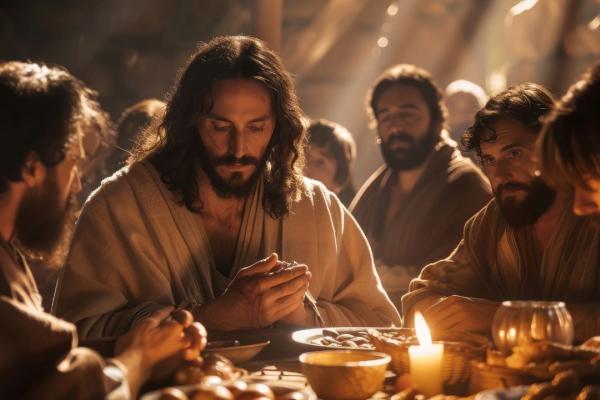By Dr. Raymond GannonThe prime mission and intention of God in His work with creation has been to perfectly manifest His glory, to demonstrate His absolutely holy character, and to fully reveal His loving nature. The Hebrew Scriptures made clear that God’s zeal for Self-Revelation to mankind would ultimately include His own coming to be born of a virgin so as to be Immanuel “God with us” (Isaiah 7:14). The Son given would be the Wonderful Counselor, the Mighty God, the Everlasting Father, and the Prince of Peace (Isaiah 9:6). And in the fullness of time, Yeshua was born in Bethlehem as prophesied (Micah 5:2). God had revealed so much of Himself, His character, His divine principles, values, and laws first in nature itself and second in the Hebrew Bible. But the day would come when God would very graphically manifest and perfectly reveal His own Person by speaking to mankind in the most comprehensive way, e.g., in the Person of His Son, whom we recognize to be our own Yeshua (Jesus) (Hebrews 1:1-3).
Yeshua’s Jewish Theater for Divine Revelation
Our Messiah, Master, and Mentor, Yeshua did come over two thousand years ago. Although we realize Yeshua came to display the glory of God, all that we see and know of the life of Yeshua is thoroughly Jewish. All that He conveys to us is through the prism of the Hebrew Bible and Jewish religion and culture. From His circumcision (brit-milah) at eight days old, to his “redemption of the firstborn” (pidyon ha-ben) experience in the Temple, to His customarily attending synagogue services, to His eating the Passover the night he was betrayed, everything depicts a thoroughly religiously committed Jewish Yeshua. Joseph, the righteous, His presumed father, would only take his new family to reside in Nazareth if they enjoyed the services of the Beth HaMidrash (“House of Study” or “Bible school”). All communities that did not maintain a Beth HaMidrash were to be under rabbinical ban. As a Jewish child, Yeshua would learn the Hebrew Bible as well as Jewish history and culture during His student days in Hebrew school. His knowledge of Torah was so complete and intelligently grasped that He stunned the doctors of the Law in the Temple courts on Passover while only in his twelfth year. We find Yeshua celebrating not only Passover, but also all of the major feasts and festivals of Israel including Chanukah (“Feast of Dedication”) in John 10:22. The Scriptures portray Yeshua as participating regularly in Shabbat services in local synagogues, particularly in Nazareth and Capernaum. He often read from the Hebrew scrolls and offered Shabbat homilies. The Jewish masses followed Him everywhere and highly valued His innovative teaching offered in classic rabbinical style. The New Testament points out that the Jewish community “heard Him gladly” as he offered them the prophetic testimony and word from heaven. His adoring Jewish audiences declared that never had a man spoken as He spoke. His teachings were Torah-consistent, enhanced genuine, spiritual worship of the One and Only God, and were healthy for the perpetuation of Jewish communal life. Later on, following Yeshua’s own impeccable Jewish religious commitments, the Messianic community born on Shavuot (the “Day of Pentecost”) from among the myriads of Jewish masses collected in Jerusalem for that pilgrim festival, was likewise authentically Jewish to the core. The Yeshua followers were recognized as Torah lovers, Temple worshipers, Shabbat-keepers, participants in Jewish social life, and fully committed as Jews to the glory of God. There were no social questions regarding the legitimacy of their Jewish religious experience or the perpetuation of their Jewish identities to new generations. All that they had seen and observed first in Yeshua and secondarily in the apostles was unquestionably Jewish and fully “kosher,” or sanctified.
Yeshua in His Religious Historical Context
The Jewish Messiah Yeshua was born into a world of (1) growing cultural confusion, (2) political intrigue, and (3) religious competition:
Growing Political Confusion
The imposing intellectual and cultural forces of Hellenism were profoundly fascinating and managed to captivate tens of thousands of Jewish People, even in Eretz Israel, then home to half of the world’s four million Jews. Greek language, philosophy, and worldview were penetrating Jewish thought through literature, cultural osmosis, international language, intellectual exchange, and deliberate cultural borrowing. The world that Alexander the Great had conquered in the fourth century B.C.E. had been divided upon his death into four major regions by his generals. Two of those regional powers, the Syrian Seleucids and the Egyptian Ptolemies, claimed rights to govern the territories of Eretz Israel. This often led to military skirmishes, such as we find in the Seleucid debacle of the early second century B.C.E. that ultimately produced the Maccabean revolt of 167 B.C.E. and the nationalistic Jewish holiday of the Feast of Dedication (John 10:22), or Chanukah.
Political Intrigue
When the sons of the Maccabees (Hasmoneans) not only assumed Temple priestly functions, but retained political leadership as well, corruption was not long in coming. Assassination and civil unrest led to Jewish appeal to Rome to render a police action to stem the violence, impose authority upon the Jewish masses, and bring peace to Israel. Well known is the fact that Rome then refused to leave or surrender its dominant role once the unrest had been squelched. The Jewish religious and civil authorities then cooperated with the Roman strongmen to solidify their own status and circumstance while tolerating Roman infusion and cultural influence upon the Jewish People. This social pot would boil over in frequent rebellions and religious evolution.
Religious Competition
Many scholars link the Sadducees to the Sons of Zadok and the Hasmonean dynasty. This aristocratic and priestly sect held immense political power with the backing of Roman authorities and did little to combat the cultural onslaught upon Jewish daily life and sense of identity. Their chief concern seems to have been the maintaining of their own aristocratic status in society at all costs. At the same time, the Sadducees used the Torah (the writings of Moses, the Law) to fortify their claims to position in Jewish society. Therefore, they fairly limited their biblical faith to Torah and did not place the wisdom literature or Prophets on any corresponding level of authority. The strict Torah compliance with Temple and priestly procedure was their best bet to retain the status quo. Largely in reaction to the often-corrupt priestly stranglehold upon the Jewish masses, another religious faction surfaced: The Perushim (“Separated Ones”). These Perushim were later identified as Pharisees. Their contempt for the corrupt systems in place as sustained by the priestly aristocracy (the Sadducees) motivated many to seek to foster religious renewal. In light of the powerful arguments of the Hebrew prophets, Jewish religion should have been of a more spiritual and holiness character than afforded under the contemporary traditional Temple system. The Pharisees then sought to foster a new understanding of Jewish faith and practice corresponding to a “priesthood of the believer.” The Pharisees were not priests, cohens, or levites, but lay scholars committed to revitalizing Jewish faith in their attempt to intensify godly devotion. They subscribed not only to the Torah, but to the entire Hebrew Bible as well. They believed that the Torah needed to be interpreted in terms of the fullness of God’s revelation given in Hebrew Holy Writ and that it should have practical application to all Jews, not just a religious elite, e.g., Sadducees. Jewish religion should not be a spectator sport but daily applied in common-man Jewish piety. Surprisingly, the Pharisees, often-intellectual giants, were curious about influences coming in from the East as well as the West. Some ideas that now surfaced were reviewed in light of Hebrew Scripture. To the consternation of many, a plethora of important religious ideas that had received little or no recognition or attention in classical Jewish religion were now witnessed as supported in the Hebrew Bible. Among these revealed teachings were the existence of angels; the ongoing struggle between the forces of good and evil, light and darkness, God and Satan; judgment for one’s earthly deeds in an afterlife and potential existence in the Bosom of Abraham (a heaven) or sheol (hell), as well as the eventual resurrection of all the dead to face God’s judgment and appropriate eternal reward. The Pharisees now sought to reinterpret priestly codes of Torah to not only have direct application to the Aaronic priesthood and related Levites, but to have real meaning for the lives of common Jews. In their attempt, then, to contemporize and make relevant the Torah, the Pharisees allowed themselves to exegete biblical passages in light of both traditional understandings and contemporary cultural practices so as to provide new and sustainable religious authority for obligatory Jewish piety and religious practice. While the Temple provided the Sadducees their constant platform, the local synagogue was the important sphere of Pharisaic influence as Pharisees often functioned as rabbis (masters or teachers) within the Beth HaMidrash, the “House of Study.” Later, when the Temple was destroyed in 70 C.E., the influence of the Sadducees dramatically waned or disappeared. But the Pharisees’ influence intensified, since the synagogue as the universal Jewish institution remained intact and became of even greater significance for purposes of sustained Jewish identity.
Yeshua, the Pharisee?
Yeshua had been raised in Nazareth and was a student in the local Beth HaMidrash. The Pharisaic or rabbinic influence upon His understanding of Jewish life and practice was profound, as demonstrated in His constant participation in synagogue life and strong theological similarity with the Pharisees on new Jewish teachings. It is small wonder that many in Israel referred to Yeshua as “rabbi” and would have regarded Him as more related to the Pharisees than any other religious party or faction. In fact, we see in Matthew 23, Yeshua’s endorsement of the Jewish Believers’ embrace of the Pharisaic contemporizing applications of Torah for everyday Jewish piety. He protested the proverbial hypocrisy of the Pharisees as their own practices often did not correspond with their otherwise sound exegesis and application of the Hebrew Bible to modern Jewish religious life. But like any teacher or preacher of any age, they were entitled and responsible to interpret the meaning of Scripture so that it had real relevance to genuine holy living for God. Yeshua endorsed their efforts. At the same time, when the Pharisees missed the mark in their interpretation, offering applications that actually were counter to God’s purposes for the original biblical text, Yeshua would boldly confront the Pharisees and call for conformity to God’s agenda as opposed to old or new misguided traditions.
Yeshua Viewed as Jewish Religious Competitor
There were competing schools of thought and camps within the Pharisees’ world. A frequent method of obtaining new disciples for their respective schools or camps was to confront a leading Pharisaic competitor in a public forum. By winning a debated point, the expectation was to gain a portion of the other’s following and add to their own. When the Pharisees witnessed the Jewish masses following a profoundly successful rabbi, Yeshua (“the common people heard him gladly”), they sought to demonstrate their intellectual superiority to capture new followers. There was often nothing particularly mean-spirited about this standard ploy, and neither Yeshua nor the masses seem surprised or especially put off by this attempt. In fact, Yeshua then used these windows of opportunity to offer correction to His beloved Pharisees in an attempt to help the misguided out of their exegetical ditch. Curiously, later Talmudic rulings comply with Yeshua’s corrections. Yeshua’s “woes” upon the Pharisees later in Matthew 23 are often misunderstood as Yeshua having profound contempt for the Pharisees and wanting to pronounce judgment upon them for their Jewishly understood beliefs and practices. Nothing could be further from reality here. The Pharisees were Yeshua’s own kinsmen for whom He was about to be voluntarily offered up as a blood sacrifice to atone for the sins of “All Israel” (and all mankind), including the sins of the Pharisees. No one was taking Yeshua’s life from Him, but He was laying it down for His friends. Yeshua’s “woes” upon the Pharisees were His authentic prophetic call to repentance that they may escape the chasm of error they were falling into. He was warning them out of His deep love and commitment to their present and eternal well being. He was not scouring or screaming. He was not over-the-top with wild emotion. He was surely protesting their misguided steps in holy prophetic aspiration that their repentance and faith would be immediately forthcoming. Rather than grinding His teeth in rage, as Yeshua was often depicted, He was more probably clutching the sides of His head in heart-aching love for the Pharisees. The power-broking Sanhedrin, of course, consisted almost entirely of Sadducees. Apparently both Nicodemus and Joseph of Arimathea were Pharisees and members of the Sanhedrin. But these Pharisees protested poor treatment of Yeshua and were not afraid to publicly cast their lots with Him. Ultimately, the book of Acts records that many Pharisees and even priests (Sadducees) came to faith in Yeshua. These would then bring their Jewish sensibilities into their Messianic Jewish faith experience and seek sound application of biblical passages to their contemporary Jewish lives in light of the Holy Spirit’s revelation in Yeshua.
Yeshua: All God, All Man, All Jewish
Yeshua’s coming provided the Jewish world and all mankind a more perfect understanding of who God is and what God is like. Yeshua said, “If you have seen me, you have seen the Father,” as well as, “I and the Father are One.” By gazing upon Yeshua long and hard, by “learning of” Him, we come to the richest understanding of God’s Person, His glory, His holiness, and His love. Yeshua is the capstone of God’s Self-Revelation. The Scriptures depict God’s original intentions for man in the early chapters of the Genesis account. The original Adam failed God and thus proving unable to perfectly reflect God’s glory and holy character, was deposed. The Second Adam, Yeshua, perfectly performed His divine mission and exquisitely conveyed the glories of God. Anyone wanting to know what God wants or expects in a human being today simply needs to take a good, long, hard look at Yeshua. Yeshua is everything God ever wanted any man to be. When God raised up seed from Abraham to fashion an apostolic nation of Israel and assigned to them the ministry of reconciliation, they recognized their purpose to include “being a blessing to all the peoples of the earth.” At Sinai they were told they were to be a “kingdom of priests” and a “holy nation.” Throughout the Hebrew Bible’s wisdom literature and the Hebrew prophets, the Jewish People are seen to be God’s missions agency, to bring all nations and peoples back to the One True God.Yeshua came to not only perfectly exhibit God to mankind and not only to be the Second Adam, one that would succeed where the first Adam had failed, but Yeshua came as the Chief Son of Israel. He is the King of Israel, the One who will lead Israel into the fulfillment of her divine mission of reconciling the nations to God. As the Great High Priest, He governs the true worship of God and distributes portfolios to all the ranks of priests. Yeshua is the greatest Jew who ever lived. He demonstrated the very greatest of Jewish piety, fidelity to God and God’s revelation, and co-labored with the Father to accomplish the entire agenda of the Father’s revealed will.Yeshua is God, yet He “tabernacled” among us to fully manifest the glories of the Majestic One on high. He successfully accomplished this divine objective while living within the confines of a Jewish man. He did this within the framework of Jewish religion and tradition as it was in the first century. If anyone should wonder what God wants of a Jewish Person today, he should know that Yeshua is the pious Jew God longs for all Jewish People to emulate.
Dr. Raymond Gannon, Ph.D., is the Director of Jewish Voice Messianic Studies at The King’s University. For more than 40 years Dr. Gannon has been in the forefront of the Messianic Movement. He pioneered and led three Messianic Jewish congregations in Los Angeles and New York from 1973-1989, before heading to minister in Israel. In Israel, he pioneered the King of Kings College (now Israel College of the Bible) with campuses in Jerusalem, Haifa, and Tel Aviv. Today he is equipping tomorrow’s leaders to reach the unbelieving Jewish world with the Good News of Yeshua the Messiah.











